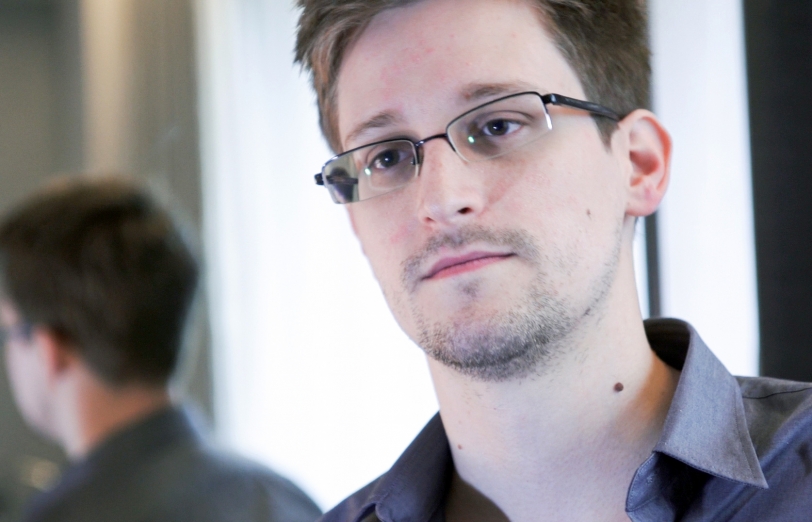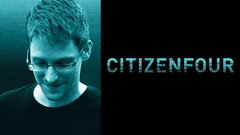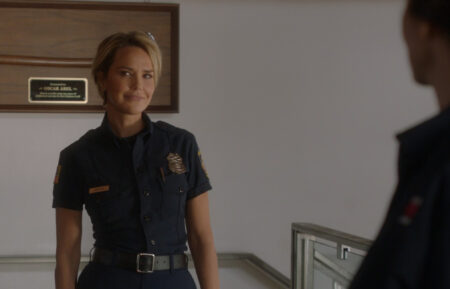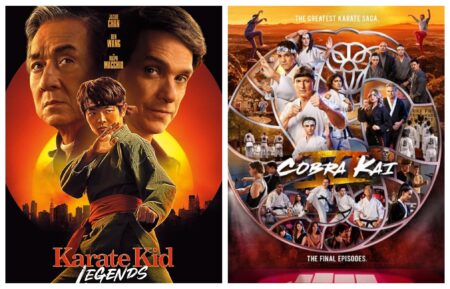Laura Poitras Talks Snowden, Oscars, and More

If you didn’t know any better, you might think Laura Poitras was a paranoid conspiracy theorist who spent too much time reading George Orwell’s 1984 and Jean Le Carré spy novels in her youth. But as the world now knows, Poitras has a reason for her fear of all-seeing government spooks.
Poitras is the documentary filmmaker who, along with journalist Glenn Greenwald, assisted NSA whistleblower Edward Snowden in revealing secret documents that outlined widespread government surveillance of ordinary Americans, including massive data collections of people’s entire digital footprint. Pentagon Papers leaker Daniel Ellsberg, a man who knows of what he speaks, has called the incendiary, Constitution-shredding revelations the most important disclosure in American history.
Citizenfour, Poitras’s humanizing, fly-on-the-wall portrait of Snowden holed up in a Hong Kong hotel room as he’s about to blow his whistle to the world, is the frontrunner to take home the Oscar for best documentary at the Academy Awards on Sunday, Feb. 22 . Then on Monday, Feb. 23, it receives its television premiere at 9pm exclusively on HBO.
While the film has been showered with awards and accolades over the past few months, even Poitras admits “it’s sometimes been hard to enjoy the ride.” Indeed, says Poitras over the phone from Los Angeles, where she’s just arrived for the Oscar ceremony, all the glamour and glitz of the awards season gauntlet has been “utterly and completely disorienting” for a low-key, spotlight-shunning person like herself. (Adding to that disorientation: Oscar winner Melissa Leo will play her in an upcoming Oliver Stone film about Snowden.)
“It’s not like this awards season doesn’t come with stress. But considering the other types of stress we’ve dealt with the past few years—you know, are we going to get subpoenaed? Is there going to be an indictment?—this isn’t so bad,” she says, with a good-natured laugh, pointing to possible legal repercussions she faces in the United States and Britain for her reporting and filmmaking activities.
Even before the Snowden revelations, Poitras knew she had reason to be worried. She was placed on a Department of Homeland Security “watch-list” not long after she made the 2006 Oscar-nominated documentary My Country, My Country, about the Iraq War seen through the eyes of a Baghdad doctor. For six years, she estimates she was detained and interrogated at the border every time she returned to the U.S., more than 40 instances in all. She once had all of her equipment, including camera and computer, seized. Another time, when she tried to assert her First Amendment right not to answer questions about her work, the border agent told her, “If you don’t answer our questions, we’ll find our answers on your electronics.”
“As a journalist, this really creates a huge chilling effect. That’s why I relocated to Berlin to edit [Citizenfour],” Poitras says of living in a growing Germany expat community for the past several years. “Because I didn’t feel confident I could cross the U.S. border and protect source material.”
It all began in early 2013 with an encrypted, tantalizing email Snowden sent to Poitras informing her that he was a senior government employee in the intelligence community and promising her that he had information to share that the American public deserved to know.
In the email, Snowden wrote, “Know that every border you cross, every purchase you make, every call you dial, every cell phone tower you pass, friend you keep, site you visit [and] subject line you type is in the hands of a system whose reach is unlimited but whose safeguards are not… In the end if you publish the source material, I will likely be immediately implicated… I ask only that you ensure this information makes it home to the American public.” He signed off with the sobriquet Citizenfour.
The suspenseful real-life story that unfolded was like a Le Carré or Graham Greene spy novel come to life, and Poitras admits that the experience felt “scary and dangerous.”

“We knew that we were going to be angering the most powerful people in the world, and that comes with risk,” Poitras says. “But the greatest risks were taken by Snowden.”
So why should the average American not engaged in terrorism or illegal activity care about the NSA spying revelations?
“All we need to do is look at the U.S. Civil Rights movement. Martin Luther King and many other activists were put under surveillance, and the FBI was monitoring all of their communication. These are people who were engaged in constitutionally protected speech. Fortunately, the country changed in response to the Civil Rights movement. But that was a fight, and citizens had to demand those rights. If you look at the historical record, any kind of political dissent is going to be targeted if you let the government have these kinds of powers.”
Citizenfour is the third is a trilogy of films, including My Country, My Country and 2010’s The Oath (centered on Osama Bin Laden’s former bodyguard), that examine the repercussions of the American response to 9/11.
“I make films about issues, but I’m really interested in films that explore the human consequences of things. How do people confront conflict and risk and the choices they make?” she says. “This film translates the abstract discussion of the NSA into more human terms.”
Poitras comes from the cinema vertité tradition of documentary filmmaking, which means capturing and revealing human struggle and conflict as it unfolds rather than conducting a series of talking head interviews.
“It’s not sitting down and doing interviews and asking people about what happened to them in the past. I’m not interested in what people think about things. I am interested in in how they act. That means being there and capturing people and events as they unfold in real time,” she says. “When life is unfolding, it’s always a series of questions and challenges—like which path to take—and each decision could lead to different consequences. And that journey contains all of this human drama.”
Statistics and rote facts often leave people cold. What really moves viewers is a human face and real emotions, from fear and anxiety to distress and pathos, happening in front of them. As a filmmaker, Poitras says she was interested in the power of images and “how the visual representation of something actually changes how we understand the world.”
“The prisoner abuses at Abu Ghraib are an example. There were reports about an investigation into prison guards at Abu Ghraib before the photographs were released. But that wasn’t on the front page of any newspaper,” she says. “So if those photographs hadn’t been released, we would never have known about what happened there.”
With Citizenfour racking up awards this season, can that have a tangible effect on shining a spotlight on the issues the film grapples with? And what happens if the film triumphs on Hollywood’s biggest night?
“I think just being nominated raises awareness of these issues,” Poitras says. “And I think we’ve already seen that the substance of the debate has shifted. People get it in a different kind of way. They get things in an emotional way… These kinds of monumental decisions that impact all citizens should not be made in secret. In a functioning democracy, these would be things that we’d debate.”
The participating families range from an injured retired Iraqi vet and his nurse wife to a family whose New Jersey house was destroyed in Hurricane Sandy. There is even a same-sex married couple trying to have a baby via in vitro fertilization. “I was looking for typical middle class deserving families, but I wanted diversity at every level,” Broome says. “When unscripted reality television works best is when you can see the representation of America in your cast.”
Broome also notes that The Briefcase is bucking the traditional standards of network reality series by not including a host and not editing around the presence of the executive producers or the camera crew. “A host felt like it would turn this into a game show where at the end of the day, this is real life,” Broome says. “You see the crew, you see my camera guys crying and you see the dirtiness of what you would typically never see on television.”
The families have 72 hours to decide how much money they will keep or give away, and throughout that period, they are presented with information about the other family’s income, culminating in a visit to each other’s houses to get a first-hand account of their living situations. They then fly to Los Angeles for the final reveal. “It sparks all kinds of conversation and debate, ” Broome says. “The question is what would you do? People are going to really scream at the television sets in a good way.”
The Briefcase‘s six-episode run begins Wednesday, May 27 at 8/7c on CBS. It is produced by 25/7 Productions and distributed by Sony Pictures Television, with Broome and Faye Stapleton serving as executive producers.







